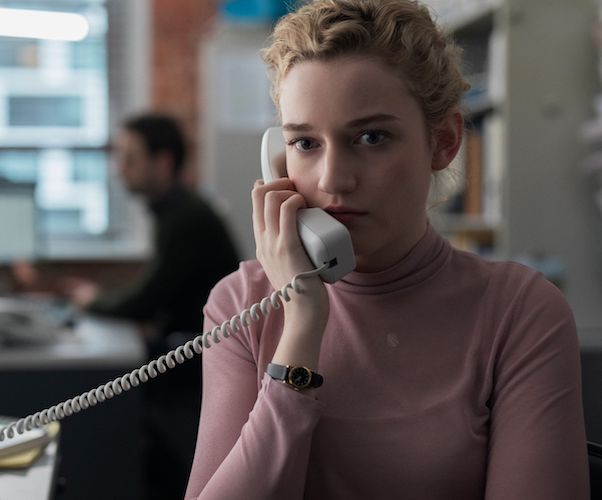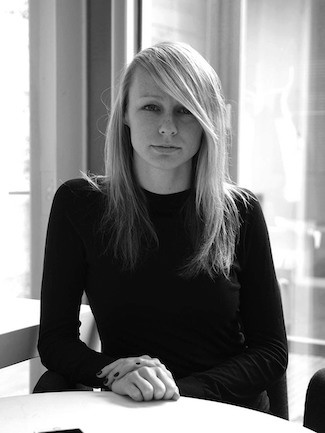Film Review + Interview: “The Assistant” — Silent Witness
By Tim Jackson
While The Assistant’s scenario alludes to Harvey Weinstein, the problem is systemic in the entertainment business and probably many other workplaces.
The Assistant, directed by Kitty Green. Screening at Kendall Square Cinema, Coolidge Corner Theater, and AMC Boston Common 19.

Julia Garner in “The Assistant.”
Behind every licentious executive there is a probably a woman or two or three, sitting in the shadows, observing, powerless, and appalled. Australian director Kitty Green’s new film, The Assistant, follows a single day in the work life of Jane (Julia Garner), a neophyte secretary to an entertainment mogul. It’s a dreary workaday job: organizing spreadsheets and schedules, ordering and delivering lunch, emptying wastebaskets, photocopying scripts and headshots that spit out of the copy machine like sausages. This is not Tinseltown but an office located in what looks like the SoHo district of Manhattan, a command center where few words are exchanged between Jane and her male cohorts. The young men chatter on their phones about box office receipts and distribution strategies and take meetings with other anonymous men in suits. All work is in service to a boss whom you barely see (he is credited as actor/director Tony Torn, though the voice is not his). Jane, a former art student and intern, has ambitions “to be a producer.” Why else suffer the tedium of such a job? She’s responsible, organized, tidy, and mostly speaks only when spoken to. She makes sure she enters and exits the elevator after those who are above her—which is everybody. She is deferential to a fault. But on this day her acquiescence is challenged.
Jane is picked up before dawn at her apartment, driven to the office, and leaves after dark. Green takes a minimalist approach to scrutinizing the small tasks that require little to no human interaction. Jane is always being watched and judged. This particular afternoon she is ordered to escort a pretty young woman just in from the Midwest to a fancy midtown hotel. The young women, a naïve former waitress, explains that she met “the boss” at a film festival and has been brought in to be tested as a new assistant. Jane is asked to train the new charge, who stares blankly at spreadsheets. She is obviously clueless about what the job requires. It turns out that these are not the kind of sheets she will have to navigate. With her pride and career threatened, Jane heads off to file a complaint with the HR chief, a smarmy middle-aged man named Wilcox (Matthew MacFadyen from the show Succession). Charming at first, he numbly stares at her as though confused (“I don’t understand. What exactly is the problem?”) With cold finesse, he dismantles the complaint. As she exits, Wilcox delivers the coup de grâce: “You’re not his type anyway.”
Focusing on a day-in-the-life encourages us to imagine the toll that this environment must take. While the scenario alludes to Harvey Weinstein, the problem is systemic in the entertainment business and probably many other workplaces. Speaking out about abusive practices while trying to start a career do not mix. Jane is smart, stylish, and knows what is expected of her: keep quiet and do the job. She is shot from directly overhead as we watch her work with cold efficiency; sometimes she is placed low in the frame, as though entombed at her desk. When people arrive for an early meeting, she hides her morning bowl of Fruit Loops rather than be caught snacking. She cleans stains from the couch. She knows not to eavesdrop. Garner makes Jane’s restraint fascinating to watch. The actress’s calm demeanor invites viewers to project what is going through her head and how she feels.
Kitty Green’s previous film, Casting JonBenet, is a fascinating social document. Green examined the cultural impact of the unsolved murder of JonBenet Ramsey by dramatizing auditions for a “film” about the crime that was never produced. The director gets at a more personal “truth” about the event by having the actors speculate about the homicide by discussing the roles for which they are auditioning.
The Assistant, too, avoids melodrama. The film is more interested in examining the environment that generates a breeding ground for complicity. Jane heads home alone—shaken—knowing that the next day will offer more of the same. It is likely she’ll lose the job. There are no dramatic bombshells and no solutions offered. With its lack of resolution or catharsis, The Assistant bears witness—and leaves us smoldering.
Interview with director Kitty Green

Kitty Green. Photo: Janina Green.
On Julia Garner:
I saw her on The Americans and thought, who is that? There was little dialogue and I needed someone interesting to look at and I thought, that’s her. She understood the character and we got along really well. We had a very special connection. She’s a ball of fun and joy but when you put that camera on her, you see everything. She’s got these big eyes that register so well on camera.
Rehearsing:
We had a lot of rehearsal time which is a real luxury: a month of pre-production and rehearsals. She went to her management office and observed everything, their tone and getting all that from them. Then we discussed it beat by beat, where she was emotionally, how worn down she could be by the end. The set was run by women so it was a lovely environment. I think it was tough getting into the mindset of someone very insignificant and that was difficult, but we had a lovely time together.
Shooting:
It was a boring place to shoot. My cinematographer had to mix it up. One thing he did was have her sink lower and lower in the office space. By the time she visits the HR she is really quite low. That is something we were quite conscious of. We didn’t have a lot of time to shoot so we pretty much stuck to the script. We were strict about that because we only had 18 days, which is nothing. Get it and move on, you know. Fortunately, we had a lot of conversation so we knew what we were doing.
Women:
I was frustrated by the #MeToo stuff because it seemed to be focused on the bad men and not about how we get more women into positions of power. The industry is in a shift change and it needs more women involved. Rather than focus on him, focus on someone with the least power. It’s a gendered division of labor: the women get the coffee and the men take the meetings. Where does it go wrong for women who are trying to make it?
I think it predates the #MeToo movement and in that sense it’s a period piece, really, even though it could be set two-and-a-half years ago. It’s different now, where people can speak about their concerns and have somewhere to go. But I didn’t want to let anyone off the hook because for so long that’s what it was like. There are green HR departments that shut people down.
My mother’s Ukrainian and I’m very bleak in my outlook. I heard so many sad stories and so many people have left the industry, so I felt like I had a responsibility to portray that accurately. A happy ending would have been untrue somehow.
On the HR scene:
The statement “you’re not his type” came up a lot, actually, in our research. It’s an individualist narrative: you only protect yourself, not anyone else. I call it an example of “gaslighting.” She can’t remember why she came in in the first place. And then she thanks him as she’s leaving.
Research:
It took a little while to get funding. Some of the executives were a little gun-shy. That’s why we shot in 18 days. Not a big budget.
There are a lot of stories of the powerful: helicopters, yachts, and so forth. I wanted a story that could be relatable to anyone. I think I achieved that because I have a lot of women from different kinds of companies come up to me who tell me they have had similar experiences. I like the idea that it is transferable.
Directing:
I make documentaries and watch a lot of documentaries. A lot of this film is like an observational documentary. There’s a lot of research in it that makes it more like a documentary.
Jeanne Dielman by Chantal Akerman is a film I like a lot. It’s a feminist classic about a woman doing housework: time and rhythm and routine, which is what my film is about. It was a big influence. David Fincher’s Mindhunter was another influence, in terms of tone and color, the palette of grays and blues, its darkness.
I also really like structure – graphing and maps. I like drawing up boxes and index cards. It’s why I like editing, too.
Tim Jackson was an assistant professor of Digital Film and Video for 20 years. His music career in Boston began in the 1970s and includes some 20 groups, recordings, national and international tours, and contributions to film soundtracks. He studied theater and English as an undergraduate, and has also has worked helter skelter as an actor and member of SAG and AFTRA since the 1980s. He has directed three feature documentaries: Chaos and Order: Making American Theater about the American Repertory Theater; Radical Jesters, which profiles the practices of 11 interventionist artists and agit-prop performance groups; When Things Go Wrong: The Robin Lane Story, and the short film The American Gurner. He is a member of the Boston Society of Film Critics. You can read more of his work on his blog.
